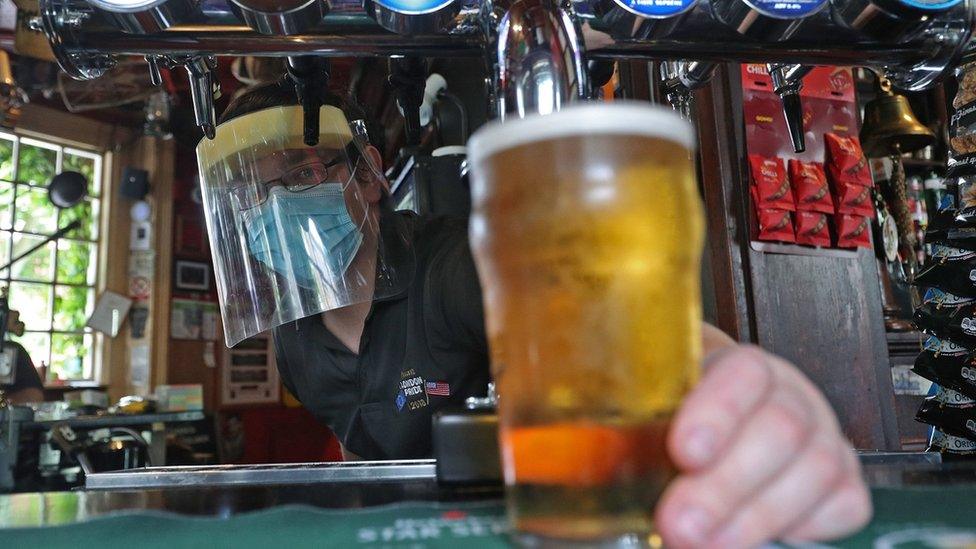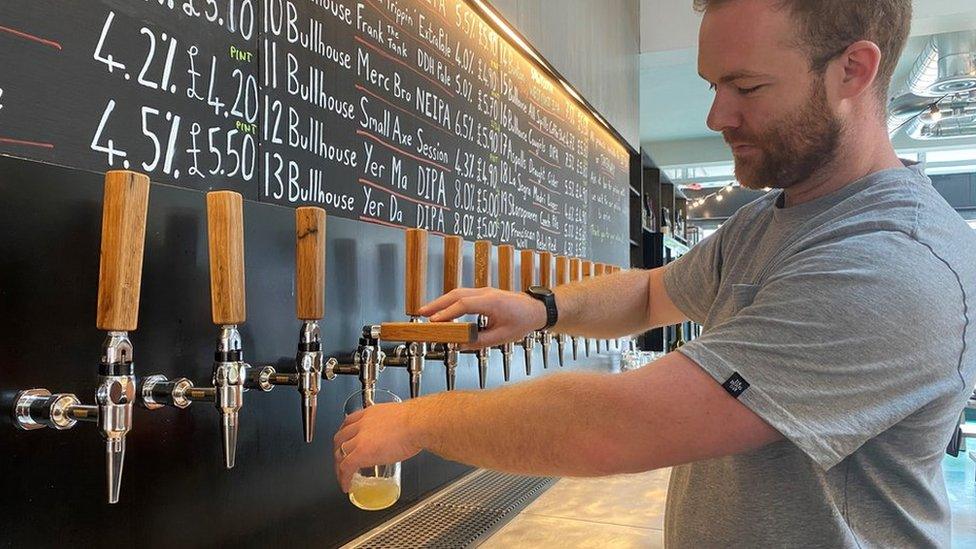Alcohol sale rules in NI 'risk stifling innovation'

The study found problems with the current system and put forward a series of recommendations for change
- Published
The rules for licensing the sale of alcohol in Northern Ireland are allowing established businesses to restrict competition and risk stifling innovation, a major independent review has concluded.
The study by experts at the University of Stirling was commissioned by Stormont's Department for Communities.
It found "deep-seated problems" with the current system's design, operation and enforcement and has put forward a set of recommendations for change.
They include banning incumbent businesses, such as pubs, from objecting to licence applications from new operators.
Supermarket sweep?
It has also recommended changes to the "surrender principle", the most distinctive part of Northern Ireland's licensing system.
It means there are a set number of licences in Northern Ireland.
If you want to open a pub or off-licence you have to obtain a licence from an existing business which is giving up or "surrendering" its licence.
The review found that most surrendered licences are being bought by supermarkets and convenience stores which can afford to pay more than new pub businesses.
It said: "Therefore, while the surrender principle protects existing pub licensees in a challenging environment, it does not appear to support growth in the pub sector as a whole."

The review found that most surrendered licences are being bought by supermarkets and convenience stores which can afford to pay more than new pub businesses
The study has recommended replacing the surrender principle with a per population cap on the number of licensed outlets by type.
It said this would be managed by a new Northern Ireland Licensing Authority (NILA) which would also introduce a time-limited buy-back scheme.
Under that scheme, licence holders could choose to sell their licence to the NILA at a price "determined by a careful estimation of true value".
After this period, all remaining licences would no longer be permitted to be sold.
Licences sold to the NILA under the buy-back scheme would enter a "pool" of licences available for reissue using an application system, subject to any cap.
Businesses that sell their licence back would be disbarred from applying for new licences for a fixed period.
Additional licences would also be issued via the pool, on successful application, if needed to reach the maximum per population cap on the number of licences in each category.
'Genuine concerns'
Dr James Nicholls, one of the report's authors, said there are "many great pubs in Northern Ireland, but the sector is in long-term decline".
"Under the current licensing system, most pubs that close are replaced by off-licences, while the reverse is almost never the case," he added.
"The existing system was established over a century ago to tackle over-supply, but we believe reform can continue to effectively manage availability while better supporting the pub, bar and cultural venue sector in the long run.
"For example, by addressing the high cost of licences on the private market and an objections system that benefits incumbent businesses – both of which can stifle innovation and reduce diversity."
He said that at "the same time, existing businesses have genuine concerns about the future and reform needs to reflect this".
The report will now be considered by the Minister for Communities, who has six months to respond.
'Validates concerns'
The review "validates many of the concerns" of the campaign group Free The Night.
The organisation, which campaigns to improve nightlife, welcomed the recommendations, including recommended changes to the surrender principle.
"Northern Ireland's nightlife has been held back for too long by an outdated system, limiting cultural expression and economic growth," said Free The Night's co-founder Holly Lester
"We urge policymakers to act on these findings and implement meaningful reform to create a thriving, diverse, and accessible night-time economy in Belfast and beyond," Ms Lester added.
Related topics
- Published3 July 2021

- Published3 July 2022

- Published6 April 2023

- Published29 January
